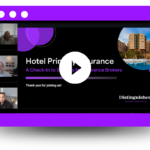Social media has impacted so many aspects of our personal and business lives over the last decade as it’s evolved from a way of individuals keeping in touch into various platforms where people get their news, companies advertise their services and products, influencers get paid to hawk products, and consumers share their delight or vent their dissatisfaction. While changing the way we communicate, social media has also raised questions around privacy and the increasing cyber threats to businesses and their communications outlets, including the social media platforms of CEOs.
Cyber attacks are among the biggest threat to businesses, according to PwC’s 23rd Annual CEO Survey, with the prospect of falling victim to hacking and other cybercrimes the risk that the majority of CEOs worry about. PwC surveyed more than 1,600 CEOs from around the world and found that many have taken actions around their personal use of technology to help protect against hackers.
The CEO Survey Says
Nearly half (48%) of the CEOs surveyed said the risk of cyber attacks has resulted in them changing their own personal digital behavior, with many either deleting social media accounts or virtual assistant applications, or requesting a company to delete their data.
Cybercriminals, according to the survey, could potentially target social media accounts in an effort to gain access to personal information about victims, while privacy concerns have been raised with regard to virtual assistants and their ability to enable unwanted eavesdropping. For example, it was suggested in a report by Bloomberg that Amazon is using dedicated teams to eavesdrop on queries made to its Alexa-enabled smart speakers in order to improve the voice assistant’s accuracy. Recordings sent to the teams do not provide full names, but they do connect to an account name, device serial number, and the user’s first name, according to Bloomberg.
Hacking Social Media Platforms
The “Social Media Platforms and the Cybercrime Economy” study conducted last year suggests that social media networks – including Facebook, Twitter, LinkedIn, and Instagram – have given attackers the means to “amplify, persuade and spread malware more quickly than email or other attack vectors.” The study’s researchers estimate that up to 40% of malware infections on social media originate from “malvertising” – the use of online advertising to spread malware. Malvertising typically involves injecting malicious or malware-laden advertisements into legitimate online advertising networks and web pages. According to the report, one in five organizations has been exposed to malware distributed via social networking channels.
Hackers also leverage social media to gain access to data by creating apps intended to collect personal information. Social media users often download third-party apps that integrate with their accounts. However, some of these apps are created and used by scammers with bad intentions. Even if the application asks for permission to access a user’s profile and content is provided, a user may have unknowingly put his or her information at risk.
Additionally, social media can be used to create a PR crisis for a company, embarrassing a CEO, with messages that he or she didn’t write. A few years ago, for example, several high-profile Twitter accounts were compromised, including the CEO of Hootsuite, the co-founder of Twitter, and Facebook’s Mark Zuckerberg. The hackers who breached Hootsuite’s CEO’s Twitter account gained entry through an app he hadn’t used in years. He had enabled Foursquare at some point to access his Twitter account. Reports (although not confirmed) later stated that Foursquare had been hacked with some accounts compromised. It is believed that the hackers used that information to get into Hootsuite’s CEO’s Twitter account.
To Delete or Not to Delete
Social media plays an important role in the way businesses communicate and engage with their customers and prospects. A brand’s CEO can play an important role in communicating a company’s mission, culture, social philanthropy, transparency, and other values. In choosing to leverage the benefits of social media, it’s important to keep accounts safe from hackers.
Social Media Tips
Following are some suggestions:
- Remove apps you no longer use: Go through your social media platforms’ network settings under the “Apps” tab to see what services you have authorized. Get rid of the ones you don’t use. Also, be aware of which third-party apps have been breached so that you can explore if your information has been potentially compromised.
- Change your passwords. It seems like a no-brainer but the fact is, having strong passwords helps keep your accounts safe. Be sure to change them periodically, as well. Zuckerberg’s hack was apparently easy to do, as he used a simple password and hadn’t changed it in several years.
- Don’t share your password with anyone. Many CEOs share their credentials with staff to help with their social media strategy. It’s better to utilize social media security tools providing other users access to your accounts without having to provide your password.
- Two-factor authentication is a must. Enable two-factor authentication on your social accounts. In lieu of simply entering a password, you’ll be asked to enter a special code sent to your phone when logging in from a new location or device.
- Beware of where you click. Phishing scams where people attempt to trick you into divulging sensitive information by posing as a reputable company or individual are on the rise on social media. That’s because profile information on social media creates a goldmine of info for hackers, the kind of data that helps them personalize phishing scams. Avoid clicking on links from unfamiliar or suspicious users.
If you get hacked, immediately take measures to mitigate the potential fallout. If your Twitter account gets compromised, delete the offending post, change your password, and get the word out that you have indeed been hacked. It’s important to maintain trust with your community; i.e., your colleagues, customers, shareholders, etc.
Cyber threats were ranked among the top worries of U.S. CEOs in the PwC’s 2020 survey. In addition, many CEOs surveyed told PwC that it is “growing harder for businesses to gain and keep trust in a more digital world.” Improving cybersecurity, including on social media platforms, is instrumental in maintaining customer confidence and protecting a company’s financial security.
Sources: USA Today, PwC, ZDNET, Harvard Business Review




